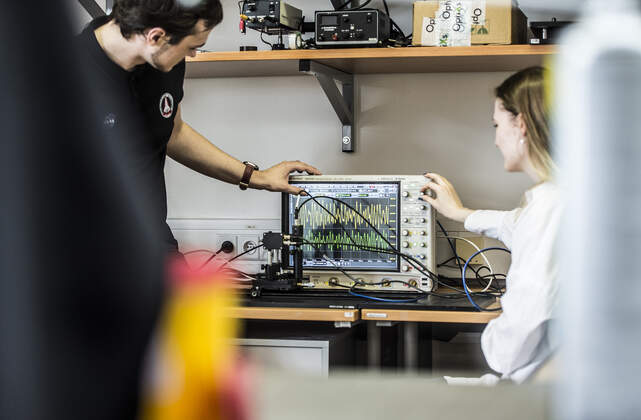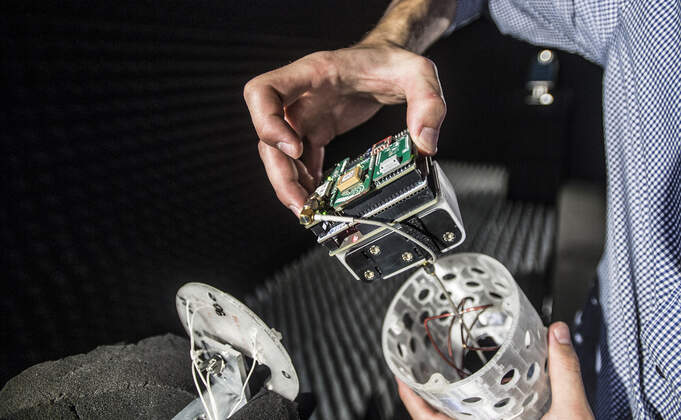"In the academic year 2025/2026, our faculty will significantly expand the offer of master's degree programmes. The prg.ai Master further strengthens the education of experts in artificial intelligence, which has so far been possible to study separately at FEE CTU only as a specialisation in the Master's programme in Open Computer Science. By introducing the Teaching of Electrical and Cybernetic Subjects for Secondary Schools programme, we are meeting the needs of vocational schools in particular, whose quality of teaching stands and falls with the generation of middle-aged and older teachers. Our graduates should gradually replace them," said Prof. Petr Páta, Dean of FEE CTU.
Students can already apply for both programmes. This is until 30 April 2025, a later deadline than for the other programmes.
prg.ai Master will provide an interdisciplinary view of artificial intelligence
In addition to the FEE CTU, the Czech Institute of Informatics and Robotics (CIIRC) CTU and selected experts from the Faculty of Social Sciences of Charles University (FSV UK) will also participate in teaching in the paid prg.ai Master programme. Thanks to this, it can provide students with a truly interdisciplinary view of artificial intelligence - from machine learning to computer vision, data engineering to natural language processing and ethics. It is the understanding of the ethical implications of the use of AI and its impact on society that is an important aspect of education in this programme.
The curriculum of this programme has been designed in consultation with Czech and foreign industry players to guarantee the graduate's ability to respond to future technological innovations and immediate employment in the field. Students can already engage in research projects during their studies, thus taking advantage of the strong ecosystem of AI experts based in Prague.
FSV UK will offer a compulsory course as part of the programme, which will focus in particular on safety issues and the limits of large-scale language models. "It will also include an introduction to the practical experience of the Czech security community in the field of artificial intelligence," says Assoc. Vít Střítecký from the Institute of Political Studies of the Charles University. The course builds on the existing educational and research activities of FSV UK, which, for example, leads the interdisciplinary TAČR SIGMA project, which aims to explore the societal implications of artificial intelligence and its potential for strengthening democratic principles.
Another benefit is the support for the prg.ai initiative, which aims to establish the Czech Republic as a regional leader in AI. The program will be taught entirely in English and is intended for self-paced students.
"The prg.ai Master study programme is a very ambitious program that aims to provide students with a solid foundation in a wide range of AI topics through an intensive schedule. We believe it is an interesting program that is attractive to both students who have just completed their undergraduate studies and are interested in a career in AI, as well as professionals who want to enter the field," says Torsten Sattler from CIIRC CTU.
More quality teachers in secondary schools
The Czech education system has long been struggling with a shortage of teachers of vocational subjects in secondary vocational schools and apprenticeships. Those focused on electrical engineering and cybernetics are no exception. This shortage is reflected in the quality of teaching and, consequently, in the interest of secondary school students in studying technical subjects at universities. In the rapid technological development of the 21st century, where technology is affecting almost every aspect of life, education in this area is crucial.
The new Master's degree programme in Teaching of Electrical and Cyber Engineering Subjects for Secondary Schools at the CTU FEL will contribute to solving this problem. It can be studied in both full-time and combined form.
The study consists of 70 % pedagogy and didactics and 30 % electrical engineering and cybernetics. It develops and deepens the professional knowledge from the Bachelor's level of study in electrical engineering, cybernetics and related fields. It also includes a compulsory teaching practice.
The Faculty of Electrical Engineering of the CTU has extensive experience in educating primary and secondary school students and their teachers. Every year, it organises the popular Robo Competition, in which primary and secondary school pupils have the task of building a robot from a LEGO Mindstorm kit and programming it to complete a given task on the playing field. You can read more about the latest edition on the FEL website. Equally popular among teachers is the annual Robotics Seminar for teachers of technical subjects and robotics clubs.
The FEE also raises young people's awareness of the importance of studying technical subjects by organising the annual Electrotechnical Olympiad. The initial round of the competition focuses on general knowledge of science, and in the final round, male and female students present their projects. All those who make it to the final round of the competition have the opportunity to enter FEL CTU without admission exams.
Students of FEE CTU are active in the field of education of future innovators, scientists and creators even in their free time. The student association wITches organizes a number of interesting workshops in programming, electrical engineering and robotics, where they teach children to make magic in IT.





